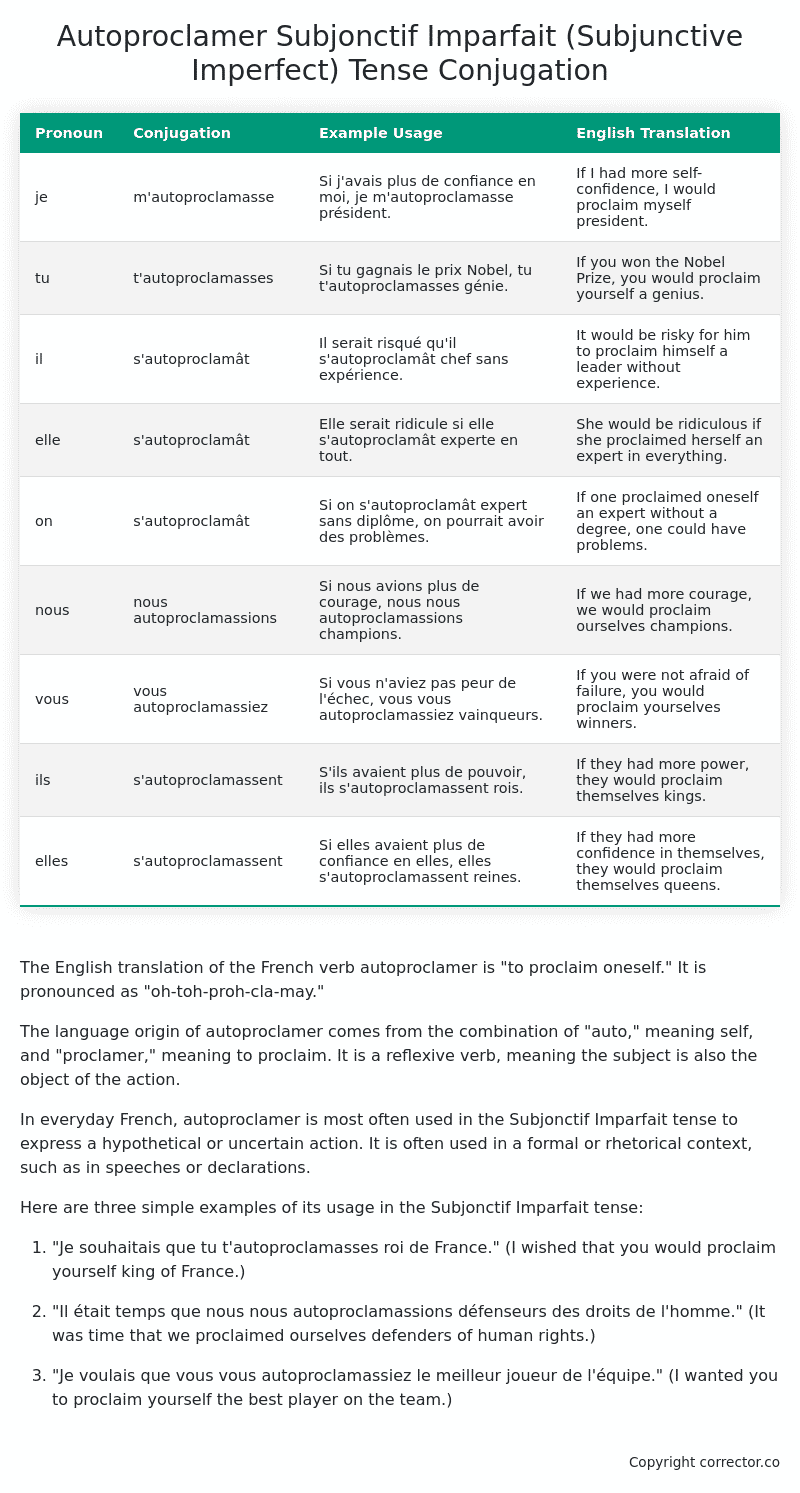Subjonctif Imparfait (Subjunctive Imperfect) Tense Conjugation of the French Verb autoproclamer
Introduction to the verb autoproclamer
The English translation of the French verb autoproclamer is “to proclaim oneself.” It is pronounced as “oh-toh-proh-cla-may.”
The language origin of autoproclamer comes from the combination of “auto,” meaning self, and “proclamer,” meaning to proclaim. It is a reflexive verb, meaning the subject is also the object of the action.
In everyday French, autoproclamer is most often used in the Subjonctif Imparfait tense to express a hypothetical or uncertain action. It is often used in a formal or rhetorical context, such as in speeches or declarations.
Here are three simple examples of its usage in the Subjonctif Imparfait tense:
-
“Je souhaitais que tu t’autoproclamasses roi de France.” (I wished that you would proclaim yourself king of France.)
-
“Il était temps que nous nous autoproclamassions défenseurs des droits de l’homme.” (It was time that we proclaimed ourselves defenders of human rights.)
-
“Je voulais que vous vous autoproclamassiez le meilleur joueur de l’équipe.” (I wanted you to proclaim yourself the best player on the team.)
Table of the Subjonctif Imparfait (Subjunctive Imperfect) Tense Conjugation of autoproclamer
| Pronoun | Conjugation | Example Usage | English Translation |
|---|---|---|---|
| je | m’autoproclamasse | Si j’avais plus de confiance en moi, je m’autoproclamasse président. | If I had more self-confidence, I would proclaim myself president. |
| tu | t’autoproclamasses | Si tu gagnais le prix Nobel, tu t’autoproclamasses génie. | If you won the Nobel Prize, you would proclaim yourself a genius. |
| il | s’autoproclamât | Il serait risqué qu’il s’autoproclamât chef sans expérience. | It would be risky for him to proclaim himself a leader without experience. |
| elle | s’autoproclamât | Elle serait ridicule si elle s’autoproclamât experte en tout. | She would be ridiculous if she proclaimed herself an expert in everything. |
| on | s’autoproclamât | Si on s’autoproclamât expert sans diplôme, on pourrait avoir des problèmes. | If one proclaimed oneself an expert without a degree, one could have problems. |
| nous | nous autoproclamassions | Si nous avions plus de courage, nous nous autoproclamassions champions. | If we had more courage, we would proclaim ourselves champions. |
| vous | vous autoproclamassiez | Si vous n’aviez pas peur de l’échec, vous vous autoproclamassiez vainqueurs. | If you were not afraid of failure, you would proclaim yourselves winners. |
| ils | s’autoproclamassent | S’ils avaient plus de pouvoir, ils s’autoproclamassent rois. | If they had more power, they would proclaim themselves kings. |
| elles | s’autoproclamassent | Si elles avaient plus de confiance en elles, elles s’autoproclamassent reines. | If they had more confidence in themselves, they would proclaim themselves queens. |
Other Conjugations for Autoproclamer.
Le Present (Present Tense) Conjugation of the French Verb autoproclamer
Imparfait (Imperfect) Tense Conjugation of the French Verb autoproclamer
Passé Simple (Simple Past) Tense Conjugation of the French Verb autoproclamer
Passé Composé (Present Perfect) Tense Conjugation of the French Verb autoproclamer
Futur Simple (Simple Future) Tense Conjugation of the French Verb autoproclamer
Futur Proche (Near Future) Tense Conjugation of the French Verb autoproclamer
Plus-que-parfait (Pluperfect) Tense Conjugation of the French Verb autoproclamer
Passé Antérieur (Past Anterior) Tense Conjugation of the French Verb autoproclamer
Futur Antérieur (Future Anterior) Tense Conjugation of the French Verb autoproclamer
Subjonctif Présent (Subjunctive Present) Tense Conjugation of the French Verb autoproclamer
Subjonctif Passé (Subjunctive Past) Tense Conjugation of the French Verb autoproclamer
Subjonctif Imparfait (Subjunctive Imperfect) Tense Conjugation of the French Verb autoproclamer (this article)
Conditionnel Présent (Conditional Present) Tense Conjugation of the French Verb autoproclamer
Conditionnel Passé (Conditional Past) Tense Conjugation of the French Verb autoproclamer
L’impératif Présent (Imperative Present) Tense Conjugation of the French Verb autoproclamer
L’infinitif Présent (Infinitive Present) Tense Conjugation of the French Verb autoproclamer
Struggling with French verbs or the language in general? Why not use our free French Grammar Checker – no registration required!
Get a FREE Download Study Sheet of this Conjugation 🔥
Simply right click the image below, click “save image” and get your free reference for the autoproclamer Subjonctif Imparfait tense conjugation!

Autoproclamer – About the French Subjonctif Imparfait (Subjunctive Imperfect) Tense
Formation
Common Everyday Usage Patterns
Interactions with Other Tenses
Subjonctif Présent
Indicatif Passé Composé
Conditional
Conditional Perfect
Summary
I hope you enjoyed this article on the verb autoproclamer. Still in a learning mood? Check out another TOTALLY random French verb conjugation!


